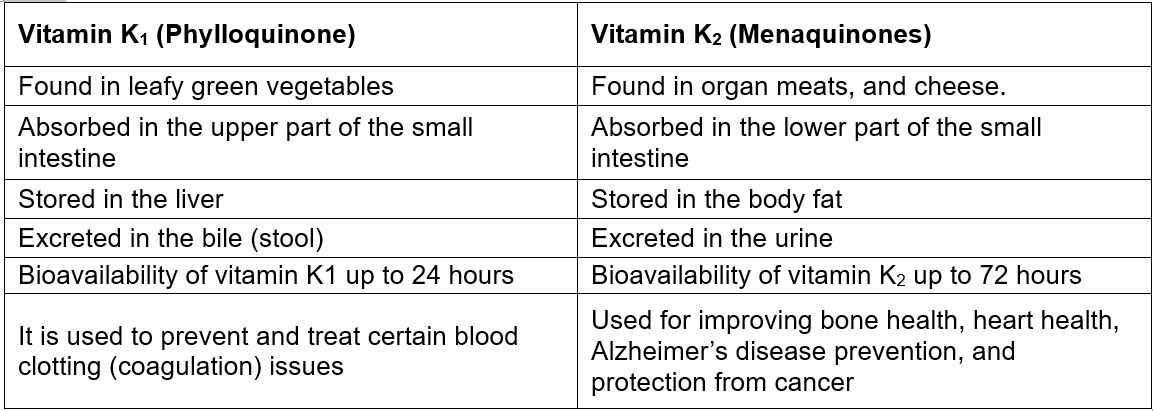Health Benefits of Vitamin K2
Vitamin K2 is any one of the two forms of vitamin K, with the other being vitamin K1. Vitamin K2, also known as menaquinone, is chiefly gotten from animal protein including organ meat. It can also be gotten from fermented foods, cheese, and even bacteria inhabiting our gut system. Vitamin K2 is composed of 10 subtypes M-4 to M-13 and plays a role in blood clotting, heart health, and bone health.
What are some health benefits of vitamin K2?
• Helps regulate calcium: Vitamin K2 is essential for the proper absorption of calcium and keeps your bones healthy by keeping calcium in your bones.
• Cardioprotective: Vitamin K2 also protects against cardiovascular disease. It activates matrix G1a protein, a vitamin K-dependent protein that helps inhibit calcium from entering soft tissues like arterial walls and forming calcified plaques.
• Improve bone health: Our bodies need calcium to build and maintain bones. When it breaks down calcium in our bodies, vitamin K2 activates osteocalcin, a protein that helps the mineral bind to our bones to do its job.
• May help fight cancer: Prostate calcification appears to be a significant factor in the development of prostate cancer. In liver cancer, Vitamin K2 supplementation has been shown to help reduce recurrence and delay progression.
• Protects against arthritis: C-reactive protein (CRP) levels rise in association with inflammation. In rheumatoid arthritis, Vitamin K2 regulates CRP.
• Blood sugar control: Vitamin K2 intake may be associated with a lower risk of developing type II diabetes and may potentially be helpful for people living with the disease.
• Anti-inflammatory: Vitamin K2 has been shown to beneficially modulate the immune system. It inhibits several pathways involved in inflammation and the release of pro-inflammatory cytokines.
• Weight loss: By improving glucose and lipid metabolism, vitamin K2 may also help reduce body weight.
What Is the Difference Between Vitamins K1 And K2?
Both vitamin K1 and vitamin K2 are forms of vitamin K but they differ significantly in their sources, bioavailability, storage, and mode of excretion. The following table highlights the differences between vitamin K1 and vitamin K2.

What Are Some Sources of Vitamin K2?
TVitamin K2 is chiefly gotten from fermented foods, including sauerkraut, natto, and dairies such as butter, cheese, and organic meat.
What Are the Side Effects?
Side effects of vitamin K2 consumption include; stomach pain, nausea, and heartburn. Constipation and loss of appetite are less serious side effects experienced with the consumption of vitamin K2.
What Are Some Drug Interactions?
Vitamin K (vitamin K2) interacts with the following medications:
Warfarin and other anticoagulants: These drugs work to deplete vitamin-K-dependent clotting factors. People prescribed warfarin or other anticoagulants are instructed to keep their vitamin K intake consistent.
Antibiotics: Antibiotics may kill bacteria in the gut that usually produce vitamin K. Supplements may only be necessary if antibiotics are required.
References:
https://www.medicalnewstoday.com/articles/325059#_noHeaderPrefixedContentVihttps://www.drstevenlin.com/vitamin-k2-benefits/
https://www.webmd.com/diet/foods-high-in-vitamin-k2
https://www.verywellhealth.com/vitamin-k-7495819